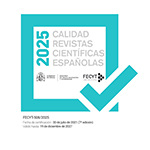Towards a political ecology of conceptual art: Tucumán Arde and Information, between sugar and oil
Abstract
From the analysis of two collective experiences of conceptual art, Tucumán Arde (1968) and the exhibition Information at MOMA (1970), this article aims to provide through the lens of political ecology a new perspective to the chapter dedicated to conceptualism in the history of art. Despite the differences between the art ecosystems in which both experiences participated, their artists' proposals shared critical elements that can inspire transformations in the discipline of art history that respond to the ecosocial crisis. The connections with sugar in the case of the Argentinean experience and the fossil condition of the artistic institutionality of advanced capitalism in which Information is inscribed confirm the bifronted character (North/South) of energetic modernity and its connections with the artistic experimentations of the avant-garde. The self-managed artists around the Tucuman experience attempted to convert art into information without going through the communication channels and spaces of globalised art. For their part, some of those who participated in the New York show resisted the uncritical and spectacular assimilation of their practices into the institutional machinery at the service of the culture industry, complicit with the market of war and fossil extraction.
Downloads
Article download
License
In order to support the global exchange of knowledge, the journal Arte, Individuo y Sociedad is allowing unrestricted access to its content as from its publication in this electronic edition, and as such it is an open-access journal. The originals published in this journal are the property of the Complutense University of Madrid and any reproduction thereof in full or in part must cite the source. All content is distributed under a Creative Commons Attribution 4.0 use and distribution licence (CC BY 4.0). This circumstance must be expressly stated in these terms where necessary. You can view the summary and the complete legal text of the licence.










